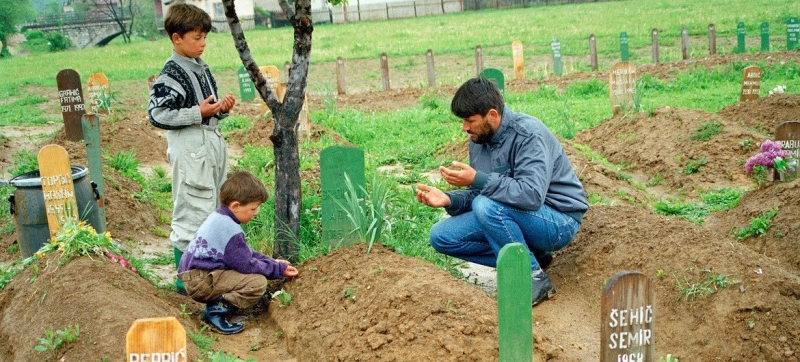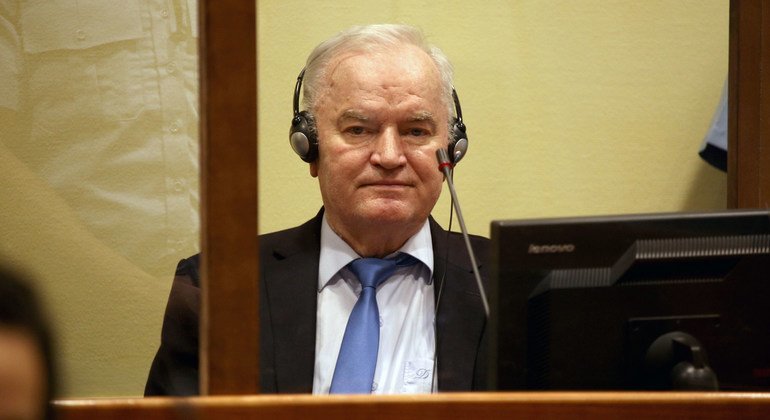
A father at the grave of his son who died in Srebrenica. Photo from the archive The UN General Assembly established an International Day of Reflection and Remembrance on the 1995 Srebrenica Genocide International Law
According to a resolution proposed by Germany with a number of co-sponsors, July 11 will be observed annually as the International Day of Reflection and Remembrance on the 1995 Genocide in Srebrenica. The document “unconditionally condemns” any denial of the genocide in Srebrenica. A representative of the UN Secretariat said that the implementation of the measures provided for in the resolution in 2025 will require from 350 to 600 thousand dollars. The document was supported by 84 states, 19 voted against and 68 delegations abstained.
The General Assembly “urges” all UN member states to respect “established facts” and incorporate them into their educational systems to “preserve memory, prevent denial and distortion [of facts], and prevent new genocide in the future.
Before the vote in the General Assembly, Serbian President Aleksandar Vucic spoke, calling on member countries not to support the resolution, which, according to him, opens a “Pandora’s box”, given the numerous massacres that have occurred over the years in different parts of the world. He paid tribute to the memory of the victims of Srebrenica, but noted that the proposed document is political in nature and directed against his country.
War in the Balkans
The war that followed the collapse of Yugoslavia claimed more than one hundred thousand lives in Bosnia and Herzegovina from 1992 to 1995, mostly Muslim Bosniaks, more than two million more were forced to flee their homes. People were detained and placed in concentration camps, thousands of Bosnian women were systematically raped – the list of atrocities committed at that time is endless, but Srebrenica was probably the darkest page of that war.
Genocide in Srebrenica
In July 1995, units of the Bosnian Serb army captured the city of Srebrenica, previously declared a UN “safe zone,” and brutally killed about eight thousand men and teenagers there. The UN was unable to prevent this genocide – a small and weakly armed contingent of Dutch peacekeepers was unable to resist the Bosnian Serb troops. The largest massacre in Europe since the Holocaust occurred. Another twenty thousand people were expelled from their city.
The International Court of Justice and the International Criminal Tribunal for the former Yugoslavia have recognized the massacre of Bosnian Muslims in Srebrenica, which was carried out by the army of the Republic Serbian, an act of genocide.
Perpetrators of war crimes
In the resolution adopted today, the General Assembly “unconditionally condemned actions glorifying persons convicted by international courts of war crimes, crimes against humanity and genocide,” including those responsible for the genocide in Srebrenica.
In 2017, the UN International Criminal Tribunal for the Former Yugoslavia sentenced the former commander of the Bosnian Serb army to life imprisonment for crimes of genocide, violations of the laws and customs of war and crimes against humanity committed in 1992-1995 in Bosnia and Herzegovina.

The judges found that for three years the military under the command of Ratko Mladic carried out a targeted campaign of murder, torture and deportation of the Muslim and Croat population of Bosnia and Herzegovina. Among the crimes committed by Mladić were the massacres in Srebrenica.
“Those who tried to defend their homes were responded to with brutal violence. Mass executions were carried out, some died from beatings,” said Tribunal judge Alphonse Arie when announcing the verdict. “The crimes committed are among the most brutal acts known to mankind. They include genocide and extermination of human beings, which constitute crimes against humanity.”
